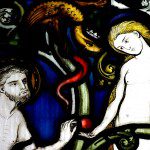Not much is said in the Bible about the Saturday in between Jesus’ death and the Sunday of his resurrection. All we know is that because it was the Sabbath, the disciples rested quietly, as was the law. It’s as though the Gospel writers just couldn’t wait to get to the good stuff.
I wish there were more to the story, although I know if we had it, it might not be as wonderful because Jesus would not be in it. Still, it might give us solace on those darkest of days when our despair is ocean-deep, and all hope seems irretreivably lost.
But that day — I can only imagine what it must have been like. It must have been an agonizing day. I imagine the disciples — these men and women who loved him so much — were exhausted after everything that had happened over the past two days. Perhaps some of them collapsed into a paralyzed sleep that Friday night, while others lay in their beds with their heads spinning, haunted by that cry he let loose on the cross. Eli, Eli, lama sabachthani?
My God, My God, why have you abandoned me?
I imagine Peter got drunk that Friday night. If I were Peter, I would have. Anything to dull the pain of memory — of my own boasting and of my utter and complete failure. I imagine him awakening with the thick tongue of a hangover, sweeping his hand down his face in an attempt to wipe it all away.
I think the day dawned grey that day, and for that brief, beautiful moment, as happens when a loved one dies, they woke up and had forgotten. There is that slippery little minute when everything is okay again, until it all comes crashing back in wave of grief and hollowness and painful, painful memory. It’s in these moments that the memory’s details are what make them so torturous — we can still remember the way a whisker lay or the glint in the eye. But the details that slice like a blade are all the more painful because we know that too soon they will start to fade.
It’s the forgetting that we are so afraid of.
I think it was a hushed day. I think Martha busied herself in the kitchen as much as possible without breaking the law. I think she made the most extravagant meal possible just to keep busy — the most extravagant meal that no one ate, and for once, she didn’t care and did not take offense. She didn’t eat it, either. Instead, she stole swipes of the kitchen counter when no one was looking and had to force herself to keep from organizing the spices.
In my head, I hear the silence that’s heavy like a thick winter cloak, the way no one really wants to talk. The clink of a dish seems loud like artillery, every sound an assault on the weary, anguished followers.
And the tension — the fear — it’s taut like a wire and has everyone on edge. Will they come and take the men away? Everyone saw us. We are known. Will they come and do the same to the rest of the men that they did to Jesus?
I imagine the shock and denial they feel, the way it all feels like a dream. Numbness pervades. In Mary Magdalene, a deep, deep longing to see him again, to rush to his body, to cling to him in the knowing it’s over. To care for his body, to serve him one last time. An anxiousness for the next daybreak so she can go to him and yet a hesitancy, a fear that the sight of him will make it all too real.
And in all of them, the feeling of hope dashed, of abandonment, of being betrayed by God. They don’t want to acknowledge these feelings, they try not to entertain the thoughts. But in the silent corners, in the staring out of windows, in the breaths that are so hard to take in, is that doubt — What was it all for? Where did you go, God? Why did we go through all this only for this to happen?
Was he not your son?
And Mary, mother of Jesus. The way her memory must play over and over, all the way back to the beginning. That angel who came to see her. The mystery of all of that. Joseph. Oh, how she must have longed to have the comfort of Joseph on that day. The memory of Jesus’ toes when he was a baby, his morning smell when he nuzzled her as a child upon waking in Egypt. The day they lost him in the temple; the wedding when she knew the way only a mother can know that yes, his time had come.
The absolute horror and sense of abandonment she felt upon seeing her baby hung up on a cross. I imagine her voice is still hoarse from the screaming, her eyes blurred red from the tears. I imagine her body is sore and bruised from where she fought against those who were holding her back. When your baby is hung from a cross, I don’t think you’re all that stoic. I think that’s the time for a soul-scream, and I think today, it hurts Mary to swallow.
I wonder if all over the land, people were talking in hushed tones about Jesus.
I wonder, if when Jesus wept over Jerusalem, he was picturing this day, his heart breaking for the sense of empty abandonment his disciples would feel.
I think we all have our own grey Saturdays, long, stretched out days of tension and despair, days where the past seems to have been a joke and the future, not enticing. I imagine that the world, with Jesus in it, was lit up bright like candy and without him, it was communist grey, the cold steel of metal and industrialized cement.
Who would want to live life like that?
Of course, we know the rest of the story. We know the next day dawned bright and sparkling with new life. The Gospel writers knew it, too, and I can’t blame them for wanting to skip over the despair. Maybe their despair was so empty and black there are no words that can appropriately fill it.
And besides, when standing face to face with the risen Messiah, when licked by the flames of his Holy Spirit, who in their right mind would want to travel back to that dark day?











